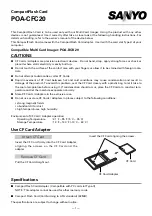
Chapter 6. NAStape 100 Tape Drives and Media
49
Caring for AIT Data Cartridges
Although AIT cartridges are ruggedly built, they must be handled with care to preserve
the data that they contain. The following are guidelines for storing and using AIT
cartridges:
• Do not open the tape access door of the cartridge or touch the magnetic tape; one
fingerprint can prevent a drive from reading the tape. Handle only the plastic tape
cartridge.
• Keep the cartridge away from sources of electromagnetic fields such as telephones,
dictation equipment, mechanical or printing calculators, motors, stereo speakers,
and bulk erasers. Do not lay cartridges on a computer monitor or on the base unit
of a computer.
• Keep the cartridge away from direct sunlight and heat sources, such as radiators
and warm air ducts.
• Keep the cartridge free of moisture. Do not wet or submerge a cartridge in liquid.
• Do not expose the cartridge to temperature extremes. Allow the cartridge to reach
room temperature slowly.
Handling of Tape Cartridges
Proper handing of tape cartridges is essential to insuring data integrity.
• Tape cartridges must be kept in a clean, dust-free environment. Store tape
cartridges in a sealed container (the individual tape case or the 15-slot cartridge
packs with the dust cover installed) when they are not loaded in the NAStape. The
Spectra Logic Pack Rack
TM
cartridge storage system is recommended when using
the 15-cartridge pack.
• Avoid abusive handling or dropping of tape cartridges. If a cartridge is
inadvertently dropped, inspect it for damage. The dust cover on the cartridge must
be properly seated or it could cause a jam condition in the tape drive.
• Cartridges should be used within the environmental specifications described in
Note:
Extreme changes in temperature and humidity should be avoided
whenever possible.
Conditioning Cartridges
Before use, the cartridge should be conditioned by exposure to the operating
environment for a time at least equal to the period during which it has been out of the
operating environment (up to a maximum of 24 hours).
















































